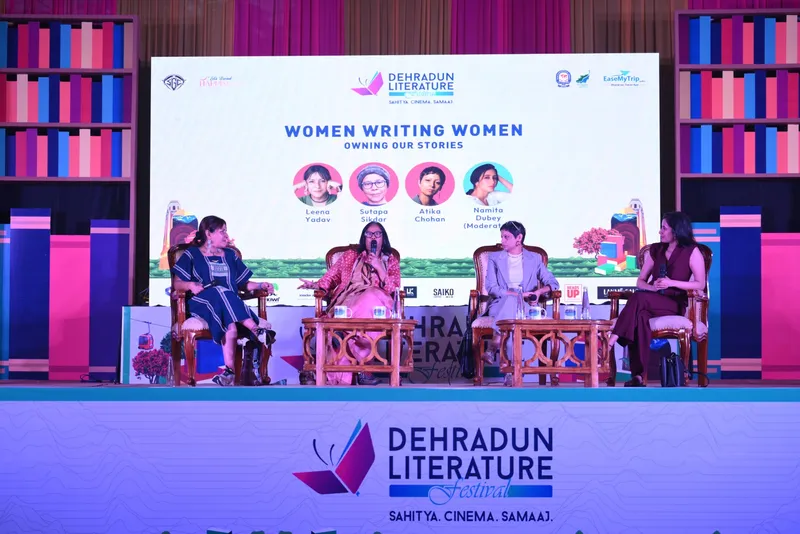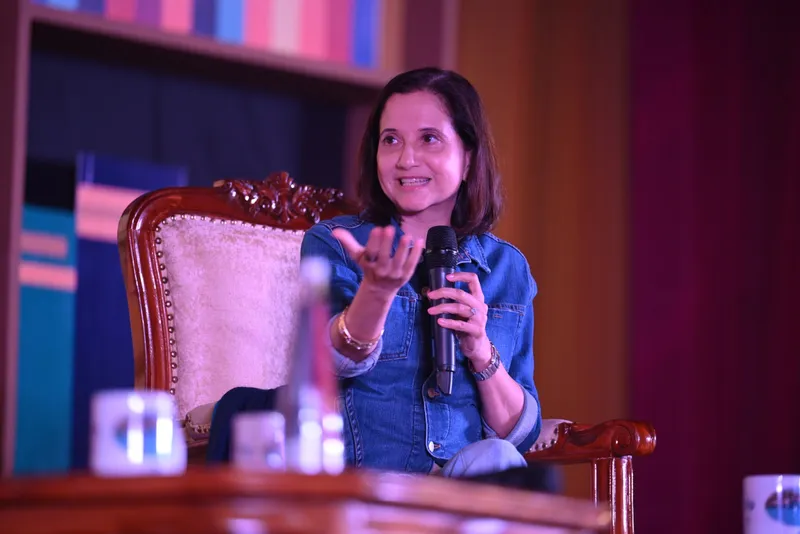Bollywood’s emancipation: How women filmmakers are changing the way women are portrayed
Indian storytellers Leena Yadav, Sutapa Sikdar, Atika Chohan, Anupama Chopra, and Sandhya Mridul shed light on the impact of storytelling through the female gaze.
When it was released in 2015, Dil Dhadakne Do caught the eye of many for its portrayal of women characters. Whether it was Anushka Sharma running away from home to escape marriage or Priyanka Chopra asserting her financial independence, the actresses challenged patriarchy in their own ways.
In one of the most impactful scenes, actor Rahul Bose, who plays Chopra’s husband, states that “he allows her to work.” This was filmmakers Zoya Akhtar and Reema Kagti’s attempt to spotlight how women's agency and decision-making are often caged.
Many other films like Parched, Raazi, Lipstick Under My Burkha, and Qarib Qarib Single have portrayed strong women characters. The common thread: these have all been written or directed by women.
Does the portrayal of women differ when the strings lie in the hands of their community? This and many more questions were answered during a panel discussion titled ‘Women Writing Women’ at the 6th edition of the Dehradun Literature Festival. The discussion featured director, producer, screenwriter and editor Leena Yadav, writer-producer Sutapa Sikdar, and screenwriter Atika Chohan.

Leena Yadav, Sutapa Sikdar, and Atika Chohan at the Dehradun Literature Festival
Small people with big dreams: the secret sauce that makes up Siddharth Roy Kapur’s movies
Dealing with tokenism
While inclusivity seems to be the buzzword today, Yadav of Parched fame talked about the discomfort in being boxed into the category ‘women writer'. “I find it strange that at one end, we are trying to get out of boxes and then being put into another box. I have never seen any such in the case of men,” she noted.
Sikdar agreed that women have to prove themselves as masters in the craft—and that's the biggest challenge.
But Chohan, who co-wrote Chhapak, has come to terms with being referred to as a ‘women writer’. But she is put off by the tokenism that often comes that is a result of the pursuit towards an equitable society.
“I am very involved in understanding what my job is. Who am I working with? What does it entail? All these things are very important to me,” highlighted Chohan. “But I am absolutely fine with being boxed.”
“I am someone who is going to be around for the next 20 years. I don't have the courage to discard the 200 years of fight by women before me to call themselves feminist,” she added.
Crafting good stories
What's important, Sikdar believes, is the focus on good storytelling. She produced Qarib Qarib Single, a film that starred her late husband and actor Irrfan Khan, and was co-written by Gazal Dhaliwal, a transwoman screenwriter.
“Will she then be called a woman writer? There are so many boxes and categories, so the battle will be completely lost. What's important is to make good stories,” she emphasised.
Adding to the discourse, Yadav believes it's not about a man writing a woman character or any other permutation or combination. The onus lies on the director and what their gaze is.
“It's the way a man looks at the world; that's where both female and male characters will come from. In the case of a woman, it's again dependent on how she is brought up and her range of experiences. It's very complex but you will reveal yourself,” said Yadav. “If you are not a feminist but make a feminist film, it will show up in the way you place your camera or how you write the story.”
At the literature festival, journalist, author and film critic Anupama Chopra, during her session ‘The Dawn of the Indian Goddess’, brought attention to the Bollywood of the 1940s and 1950s where films helmed by male filmmakers like Bimal Roy portrayed strong women characters.

Anupama Chopra--journalist, author and film critic
“There were so many roles for women in the 50s. It was called the golden age of Hindi cinema. I think over the 60s and 70s, with the coming in of the angry young man and Amitabh Bachchan being glorious, everything else moved to the sidelines and women became ornamental,” she reiterates.
In the 1980s, women were reduced to being ‘lampshades’ in scenes and were not pivotal to the plot. “But…in the last 15 years, women have reclaimed their space. It's a long road and we are far from anywhere near equity but we are far ahead of where we were,” says Chopra.
A higher appetite for risk
One thing that makes women writers and actors stand apart is their attempt to create more grey characters that are willing to push boundaries.
Chohan agreed. “Look at women and where we are in our lives. We are all risk takers; we are not supposed to be doing this but have powered through and have arrived and survived and been doing this for a while.”
Actor Sandhya Mridul, who had stints in television and films, and is now making her presence felt on OTT platforms, believes she stood her ground even when she was being typecast as ‘bold’.
During the session, ‘The Dawn of the Indian Goddess', she said, “I think I still carry a certain image. I had to control my impulses for a long time so that I was not out of work. Women are either seen as vamps or goddesses. But I kept trying to do things which brought some substance.”
Additionally, covering sex and sexuality is often deftly handled by women. Yadav, through her movie Parched, turned the spotlight on rural women and how their sexuality is both coveted and despised.
“Touch is a big theme for me in my films which I explored very closely in Parched. As a human being, I feel touch is a stronger vitamin. Somehow we are getting isolated from that. We are becoming cold. We need body touch. I want to use my films to remind people of,” explained Yadav. “Sexuality is a huge obsession with me, I want to encourage conversations everywhere.”
Portrayal of intersectionality
The buzzword today is intersectionality, be it on- or off-screen. How does it play out for these women writers and directors who tell stories through the lens of class, sex and gender?
Yadav has problems with intersectionality forced on stories. “I see that so much now, even inclusivity. These words are big traps.”
Sikdar has the same view and has observed Indian actors being included in international projects today even if there's no requirement. “It has nothing to do with that character. Filmmakers want it today; everything has turned into a formula and that's become a very dangerous zone.”
Chohan is concerned about appropriating someone else's narrative. For instance, if there are several stories about strong Dalit narratives, she feels it's not her place to tell that tale.
“I may have an opinion on something but it isn't always my tale to tell. I might go into a room where I can help other people find their skills as an ally in the room. But I do feel that that's my way of bringing in intersectionality,” she added.
“If it's forced intersectionality, it is of disservice to everybody. So anyway, it's pointless. But I think actually telling a story for its true humanity is the byproduct,” she concluded.
Edited by Kanishk Singh







